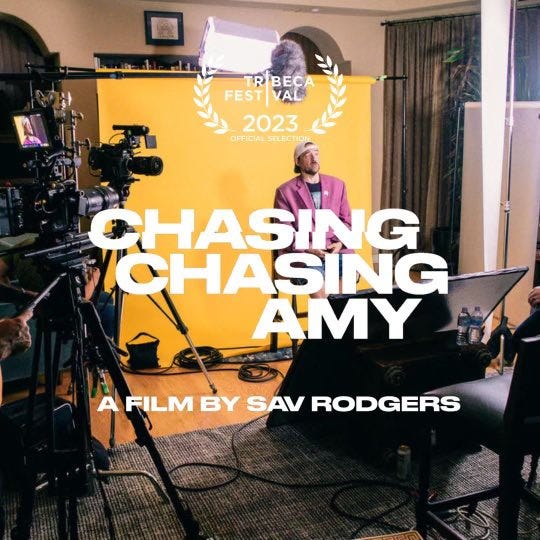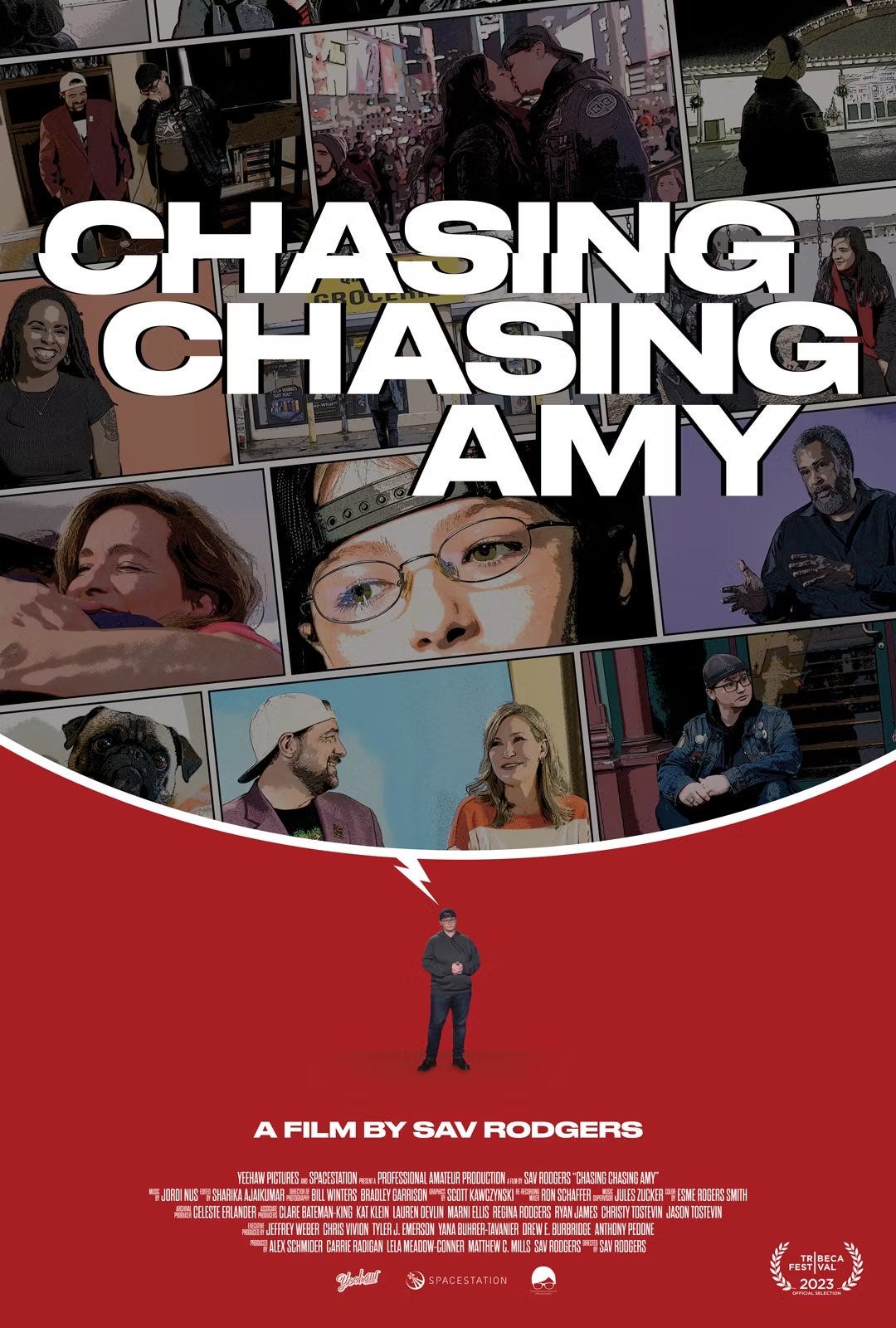A Quick Chat w/ Sav Rodgers!
On his new film, meeting our idols, and the queer film canon
It’s always so rad when the things we dug so much in our youth show up in our adult futures in a far more connected way. As queer folks, maybe we watch films sometimes with different eyes. Not all of us are reading between the lines of the dialogue, or are deeply connecting with a character but a lot of us did. I did — and so did Sav Rodgers. In his new film Chasing Chasing Amy, he explores his connection to the 1997 Kevin Smith film Chasing Amy.
We watch as he smiles taking us on tours of places from the film, see him get to chat with the director himself, and see his feelings and connections to the film evolve into something way bigger. Part of my plan, when I was Culture Editor at Autostraddle, was to explore parts of the queer pop culture canon after they had big anniversaries. To invite queer folks who had serious connections with these things to let us know how they felt about those things today. So I came up with “It’s Your Anniversary!” and had folks talk about the music, plays, and of course films all these years later.
I actually really dig Kevin Smith — I cannot begin to explain the fucking hold that Mallrats had on me one summer — so when Chasing Amy was having a big anniversary last year (25 Years) I knew I would be able to find a Black queer person to chat about their love of the film, and I did. I thought about that piece, that film, and this new doc and knew I had to talk to Sav.
AND I DID! We had a cute quick chat during Tribeca! We talked about the film, meeting our idols, and the Superstar: The Karen Carpenter Story which if you have never seen it you must watch it — most of the actors in the film are Barbie dolls, it’s fucking fascinating.
Let’s get into it!
Did you think you would end up finding the deeper story behind the film? Or did you hope for this journey it took you on to stay homage based?
I certainly hoped to find a deeper story beyond what I initially thought was possible. My favorite documentaries are ones that end up being surprising. And as a guy who had done a lot of research about Chasing Amy, this all was incredibly unexpected. I couldn’t have imagined it would have turned out like this.
What was the biggest layer that was pulled back for you during this journey? Not necessarily about the film but about your connection to it.
It was probably my own naivete. You know, I was so focused on the broader feelings Chasing Amy inspired as a film and my own personal experience with it. When you watch the doc, you can really see my real-time changing perspective on my own connection to it. As time went on and I talked to more and more people, my POV changed. I fully wasn’t expecting that I would come-of-age as we made our film.
How are you feeling about the conversations this will spur from queer folks who really did not enjoy Chasing Amy? What does your film mean for Chasing Amy in the queer film canon? Do you think it will put an asterisk on it and what would that asterisk mean?
Honestly, I’m excited for folks who didn’t like Chasing Amy to see the documentary. We tried to hold space for all points of view here and really show how multiple things can be true at once. I have no clue how our movie will impact Chasing Amy’s legacy, but my sincere hope is that it helps folks reflect on just how personal and subjective cinema is to us as movie lovers.
Are there some other old-school queer films that you’d be interested in seeing folks re-examine?
There are so many films I’d love to learn more about. I pretty much devour any book or oral history on cinema I can get my hands on, and I’ll never know enough. Someone wrote a book about it, and I need to read it, but I’d really love to learn more about the history of making Superstar: The Karen Carpenter Story. In terms of queer films, I’d love a retrospective on how Different From the Others was made and any other really early pictures like that. If that already exists, I’d love to see it or read it.
Your personal story — your relationship — is so woven into the documentary. Did you feel obligated because of your audience to include that or did you find that private element necessary to include because it was such a pivotal part of your story?
It’s a great question. Initially, I didn’t want to be on camera. It was going to be a pretty straightforward documentary about the intersection of Chasing Amy and the LGBTQ+ community’s response to it. It was going to grapple with questions about what makes “good” or “bad” representation. And then slowly, I became an onscreen presence because the rest of the filmmaking team kept saying they thought my story was the most interesting piece for them. And then eventually, I became the primary participant as a result of embracing the story that was naturally occurring.
There was a bit of a balance I had to figure out: I was the director, but also now the main character in the movie. And for me as a person, it was extremely uncomfortable. I wasn’t setting out to do that. As a filmmaker, I knew the story was evolving and we had to roll with it. And thanks to many conversations with the incredible collaborators I was lucky enough to work with on this to discuss the story with, I was able to get a little more comfortable with sharing my own personal story, which includes my relationship with Riley. It was necessary, but I also think it was healthy to be really discerning about all of that. It’s not a normal amount of attention.
Should we meet our idols?! Like you have spent time with the person who created this film that was life-changing for you — do you wish you could have kept Kevin just as that person who created the film or do you dig the evolution of your relationship to him as what seems like a friend?
While I can’t answer that question for everybody, I’m quite thankful for the journey I got to go on as a result of making Chasing Chasing Amy. Getting to know Kevin was such an important part of it–and our rapport transcends the movies we’ve both made now. I’d say that’s much better.
Now that your film is out, you’re sharing not just your connection to Chasing Amy but a wildly personal journey and a few personal stories — are you ready to leave Chasing Amy behind?
Rather than leave Chasing Amy behind, I’m thrilled that it’s played such an important role in my life and in my development as a storyteller. That said, I think Chasing Chasing Amy says everything I want to say about my relationship with Kevin’s film. I’m really looking forward to telling new stories.
Extras:
Big love to Sav for chatting with me even though he was extra fucking busy during this time!
Big love to Alex for helping me pull this together and forever being kind to me and spreading the love and opportunities.
I had a crush on Joey Lauren Adams in Mallrats and Bio-Dome and also wanted her clothes in both films.
Her popping up in Gen Q was the only good thing I remember.
My fav sub-genre is films that take place in one day and Mallrats is on that list.
I’M SCARED TO MEET DESIREE AKHAVAN AND ISSA RAE!





